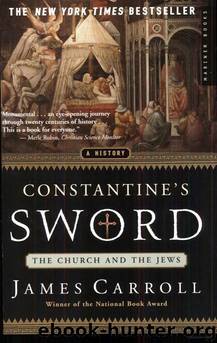Constantine's Sword: The Church and the Jews by James Carroll

Author:James Carroll [Carroll, James]
Language: eng
Format: epub
Tags: Religion, Christianity, Catholic, History
ISBN: 9780618130993
Google: FewzTELynqUC
Amazon: B002F6T4T0
Publisher: Mariner Books
Published: 2001-12-14T16:00:00+00:00
36. The Roman Ghetto
STAMP FOR INFAMOUS POPE" was the headline in a Catholic newspaper not long ago.1 The story reported that the Vatican had just unveiled a new postage stamp honoring Pope Alexander VI (1492–1503). First known as Rodrigo de Borja y Borja, he was one of the notorious Borgia popes. He was also the nephew of a pope and the father of numerous children, including Lucrezia Borgia. His son, Cesare, whom he made a cardinal at age eighteen, was likely the murderer of his brother Juan. Alexander VI drew the demarcation line dividing the New World between Spain and Portugal, commissioned Michelangelo to design a new St. Peter's Basilica, and saw to the burning of Savonarola (1452–1498), the Dominican reformer who had challenged the Medicis in Florence.2 Alexander VI's intrigues and appetites made him, in the words of the postage-stamp story, "an example of why the Church should pronounce a millennial mea culpa for historic wrongs." Apparently, the stamp was being issued only because of the parallel between the Vatican jubilee years of 1500 and 2000.
Oddly, there is one way Alexander VI may well be deserving of a respectful commemoration—his refusal to endorse the gravest of "historic wrongs." He was a man of Catalonia, and had been a subject of Queen Isabella. His admiration for her and Ferdinand, and his effort to ingratiate himself with them, is reflected in his having bestowed on them the honorific "Catholic Monarchs" not long after he ascended to the Chair of Peter. It may even be that Alexander did so, as one historian suggests, in appreciation for their having expelled the Jews from their realm.3 But if so, that response was overridden in the pope's own heart when large numbers of desperate Iberian Jews began presenting themselves at the borders of papal territories in Italy, including the gates of Rome. The arrival of these Jews in Italy—all told, they would have numbered close to nine thousand4—was a jolt to Italian Christians and Jews alike. "You would have thought that they wore masks," one Christian who watched them wrote. "They were bony, pallid, their eyes sunk in the sockets; and had they not made slight movements, it would have been imagined that they were dead."5 The historian Cecil Roth reports that in Genoa, friars greeted the starving refugees at the docks, "a crucifix in one arm, and loaves of bread in the other, offering food in return for conversion."6
But not in Rome. The Jewish community already living there probably numbered about a thousand people,7 and suddenly nearly that many, or perhaps more, Spanish refugees decamped on the Appian Way, asking to be admitted. These may seem to be small numbers, but according to the historian Kenneth Stow, whose work informs my discussion of Jews in Italy, the entire population of Rome then was only about 50,000.8 An equivalent in today's figures to the number of Iberian Jews arriving in Rome in the summer of 1492 would be about 100,000. The Roman Jewish community had
Download
This site does not store any files on its server. We only index and link to content provided by other sites. Please contact the content providers to delete copyright contents if any and email us, we'll remove relevant links or contents immediately.
The Gnostic Gospels by Pagels Elaine(2527)
Jesus by Paul Johnson(2352)
Devil, The by Almond Philip C(2324)
The Nativity by Geza Vermes(2226)
The Psychedelic Gospels: The Secret History of Hallucinogens in Christianity by Jerry B. Brown(2149)
Forensics by Val McDermid(2088)
Going Clear: Scientology, Hollywood, and the Prison of Belief by Lawrence Wright(1977)
Going Clear by Lawrence Wright(1962)
Barking to the Choir by Gregory Boyle(1819)
Old Testament History by John H. Sailhamer(1809)
Augustine: Conversions to Confessions by Robin Lane Fox(1769)
The Early Centuries - Byzantium 01 by John Julius Norwich(1736)
A History of the Franks by Gregory of Tours(1720)
A Prophet with Honor by William C. Martin(1717)
Dark Mysteries of the Vatican by H. Paul Jeffers(1707)
The Bible Doesn't Say That by Dr. Joel M. Hoffman(1676)
by Christianity & Islam(1627)
The First Crusade by Thomas Asbridge(1601)
The Amish by Steven M. Nolt(1563)
